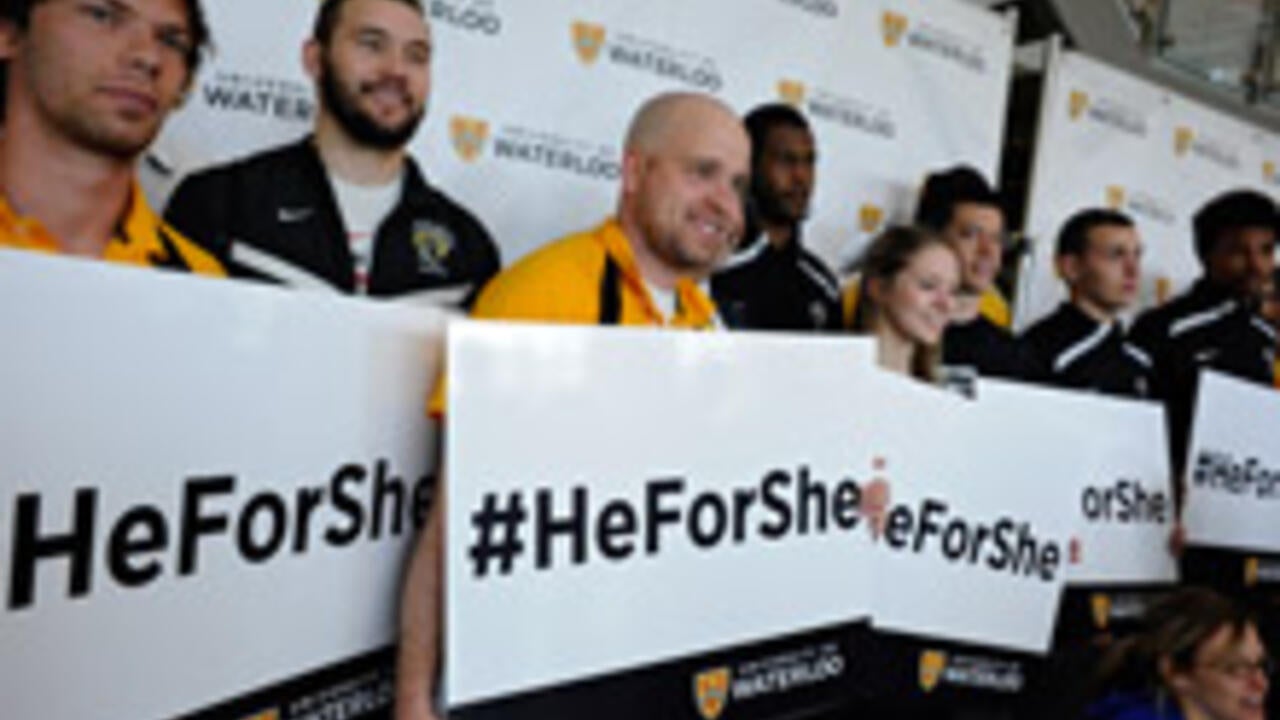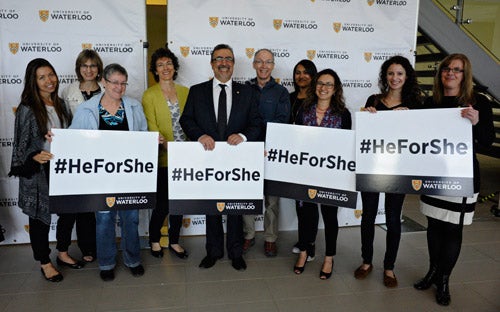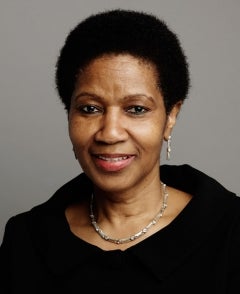
Advance gender equity by involving everyone
University of Waterloo celebrates its first year in global HeForShe initiative

University of Waterloo celebrates its first year in global HeForShe initiative
By Rose Simone University RelationsThe long struggle for gender equity in Canada and around the world has made one thing obvious: It doesn’t just happen.
For equality to become truly rooted in a culture, everyone needs to be involved. Not just women, but also men, businesses, government and institutions of every kind.
In late 2014, a global groundswell of support for gender equality coalesced into the UN Women’s HeForShe initiative. HeForShe is a movement that invites people around the world to stand together, creating a bold, visible force for gender equality. University of Waterloo was one of 30 global organizations — 10 universities, 10 corporations, 10 heads of state — invited to lead the movement, as part of Impact 10x10x10.

The University of Waterloo announced its involvement in the HeForShe Impact 10x10x10 initiative in May 2015.
Feridun Hamdullahpur, Waterloo’s president and vice-chancellor, recognized this as a powerful opportunity for like-minded individuals and organizations committed to equality to come together and create transformational change. Working with Diana Parry, a professor of recreation and leisure studies and Waterloo’s special advisor to the president on women’s and gender issues, Hamdullahpur announced a five-year plan for change built around three gender equity commitments, kicking off the initiative with a campus-wide celebration in May 2015.
“Ending gender inequality begins in many ways with education,” Hamdullahpur says. “Enabling more women and girls to reach their full potential — especially in the STEM disciplines of science, technology, engineering and mathematics — is critical to the betterment of institutions and society.”
On June 8, Waterloo will mark a year of advancing gender equity, with a keynote address by Phumzile Mlambo-Ngcuka, United Nations Under-Secretary-General and Executive Director of UN Women.
Mlambo-Ngcuka leads the HeForShe initiative globally. She was actively involved in the struggle to end apartheid in her home country of South Africa, where she served as Deputy President from 2005 to 2008.
Her visit to Waterloo acknowledges the tremendous progress that has already been made, one year into Waterloo’s five-year gender-equity commitment, Parry says.

Phumzile Mlambo-Ngcuka, UN Under-Secretary-General and Executive Director of UN Women
For Waterloo, the one-year milestone is a celebration of progress and change.
The university made commitments in three areas: boosting the participation of girls in science, technology, engineering and math (STEM) activities and experiences; enhancing female faculty representation; and bringing more women into leadership positions at the university.
“It gives us a framework to really look at our campus and identify and address gender-specific concerns while contributing to a global movement for gender equity,” Parry says.
Not only will the university benefit from these efforts, all of society will. More diversity means a more productive and effective economy, Parry says. “So while there is a moral argument around gender equity, there is an economic one as well.”
Working with partners across campus, Waterloo developed specific initiatives and programs in each area to help meet its goals.
For example, new HeForShe scholarships will go to 24 outstanding female students in STEM programs over the next four years. Efforts to boost female participation in computer science and to make recruitment policies and processes more gender sensitive have also been initiated. Gender equity research grants will support the work of faculty.
The university has named Faculty advocates who gather input on gender equity concerns, issues and challenges, and work with stakeholders to address those concerns. Roundtable discussions on leadership issues elicited further feedback.
Many more projects are planned, including a graduate student conference on gender equity and physics-based activity day for girls.
The key aspect is involvement, Parry adds. “This is a program where it really is ‘the more the merrier,’” she says. Anyone who has an idea or wants to get involved should contact the HeForShe initiative leaders centrally, or the Faculty advocates.

Read more
Upside Robotics secures new funding to accelerate the future of sustainable farming

Read more
Discover the meticulous work that uncovered Black stories on campus and preserved them for the future

Read more
The Government of Canada announces funding to support research in food policies and medical devices
The University of Waterloo acknowledges that much of our work takes place on the traditional territory of the Neutral, Anishinaabeg, and Haudenosaunee peoples. Our main campus is situated on the Haldimand Tract, the land granted to the Six Nations that includes six miles on each side of the Grand River. Our active work toward reconciliation takes place across our campuses through research, learning, teaching, and community building, and is co-ordinated within the Office of Indigenous Relations.